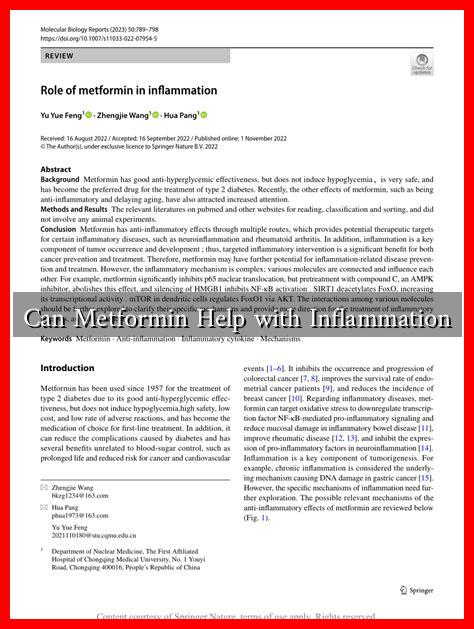-
Table of Contents
Can Metformin Help with Inflammation?
Metformin, a medication primarily used to manage type 2 diabetes, has garnered attention in recent years for its potential anti-inflammatory properties. As chronic inflammation is linked to various health issues, including cardiovascular diseases, obesity, and autoimmune disorders, understanding the role of metformin in inflammation could have significant implications for treatment strategies. This article explores the relationship between metformin and inflammation, supported by research findings and clinical insights.
Understanding Inflammation
Inflammation is a natural response of the body to injury or infection. However, when it becomes chronic, it can lead to various health problems. Chronic inflammation is characterized by:
- Prolonged immune response
- Increased production of inflammatory cytokines
- Tissue damage and dysfunction
Conditions such as rheumatoid arthritis, inflammatory bowel disease, and even certain cancers have been linked to chronic inflammation. Therefore, finding effective anti-inflammatory treatments is crucial for improving patient outcomes.
Metformin: A Brief Overview
Metformin is an oral hypoglycemic agent that primarily works by decreasing hepatic glucose production and improving insulin sensitivity. It is widely prescribed for managing type 2 diabetes and has been associated with weight loss and cardiovascular benefits. However, recent studies suggest that metformin may also possess anti-inflammatory properties.
Metformin and Inflammation: The Evidence
Research has indicated that metformin may help reduce inflammation through several mechanisms:
- Inhibition of NF-kB: Metformin has been shown to inhibit the nuclear factor kappa-light-chain-enhancer of activated B cells (NF-kB), a key regulator of inflammation.
- Reduction of Cytokine Production: Studies have demonstrated that metformin can lower the levels of pro-inflammatory cytokines such as TNF-alpha and IL-6.
- Improvement of Gut Microbiota: Metformin may positively influence gut microbiota composition, which plays a role in modulating inflammation.
For instance, a study published in the journal *Diabetes Care* found that metformin treatment was associated with reduced levels of inflammatory markers in patients with type 2 diabetes. Another study in *Nature Communications* highlighted metformin’s ability to modulate the immune response, suggesting its potential as an anti-inflammatory agent.
Case Studies and Clinical Insights
Several case studies have illustrated the potential benefits of metformin beyond glycemic control:
- A study involving patients with rheumatoid arthritis showed that those taking metformin experienced a significant reduction in disease activity scores compared to those not on the medication.
- In patients with obesity-related inflammation, metformin treatment led to decreased levels of C-reactive protein (CRP), a marker of systemic inflammation.
These findings suggest that metformin may not only help manage blood sugar levels but also play a role in reducing inflammation in various populations.
Potential Limitations and Considerations
While the evidence supporting metformin’s anti-inflammatory effects is promising, it is essential to consider potential limitations:
- Individual Variability: The response to metformin can vary significantly among individuals, influenced by genetic, environmental, and lifestyle factors.
- Long-term Effects: More long-term studies are needed to fully understand the implications of metformin on inflammation and its potential side effects.
- Not a Standalone Treatment: Metformin should not be viewed as a replacement for other anti-inflammatory treatments but rather as a complementary approach.
Conclusion
In summary, metformin shows promise as a potential anti-inflammatory agent, particularly in populations with chronic inflammatory conditions. Its ability to modulate inflammatory pathways and reduce cytokine production may offer additional benefits beyond glycemic control. However, further research is necessary to establish its efficacy and safety in this context. As always, individuals should consult healthcare professionals before making any changes to their treatment plans.
For more information on metformin and its effects, you can visit the National Institutes of Health.

